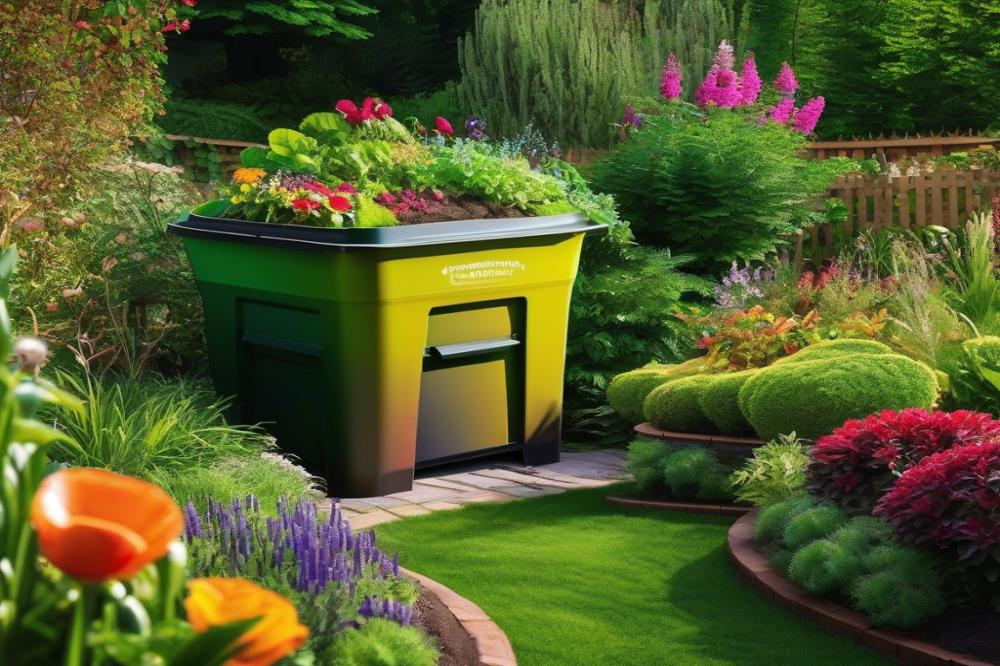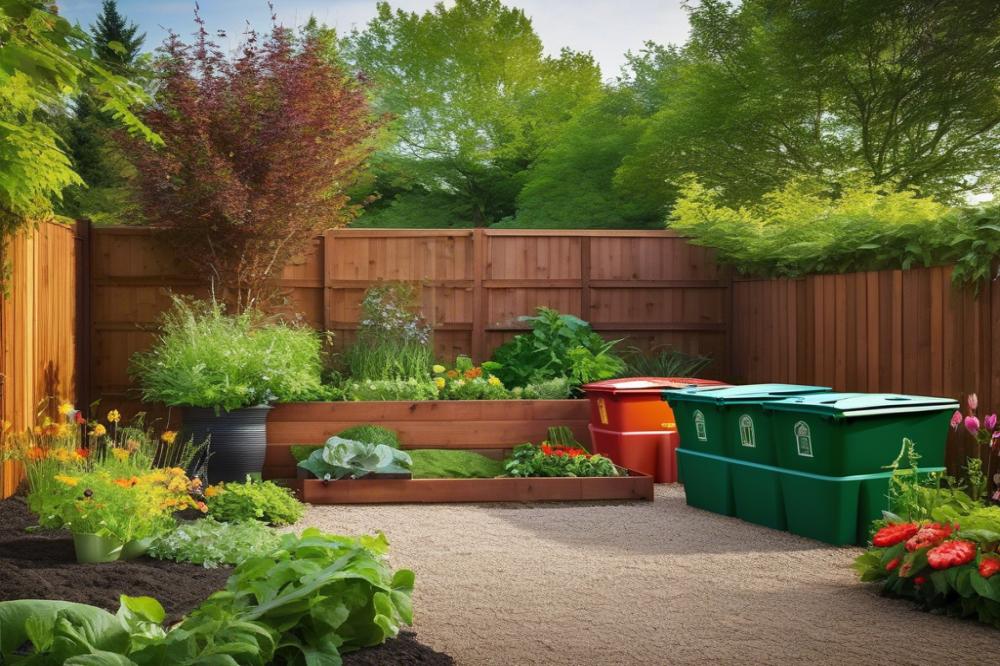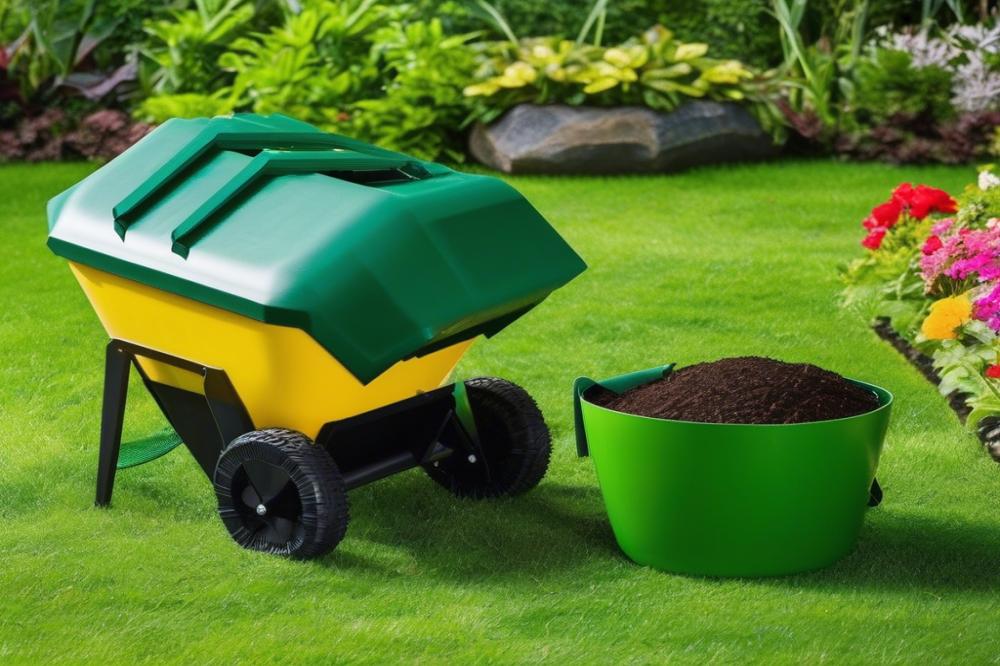Choosing the Right composting-bins-vs-tumblers-which-is-right-for-you”>composting bin for Your Garden
Composting plays a vital role in gardening. Turning kitchen scraps and yard waste into nutrient-rich soil is an excellent way to support plant growth. This process not only enhances soil quality but also reduces the amount of waste sent to landfills. The practice encourages healthy ecosystems and is a crucial part of eco-friendly gardening.
Utilizing a compost bin makes the task of garden composting easier and more effective. These containers help with the decomposition process by retaining heat and moisture. Different compost bin types are available, catering to various needs and spaces. Whether you have a large backyard or just a small patio, there is a suitable option out there. The right compost bin can make a world of difference in how quickly and efficiently your compost breaks down.
Throughout this article, you will discover valuable composting tips that can enhance your gardening experience. Expect to learn about the best compost bin options available on the market. We will delve into compost bin reviews to help you choose wisely. Sustainable practices in gardening are not only important for your plants but also for the planet. By adopting effective composting methods, you contribute positively to the environment while enjoying the benefits of your garden.
Understanding Composting
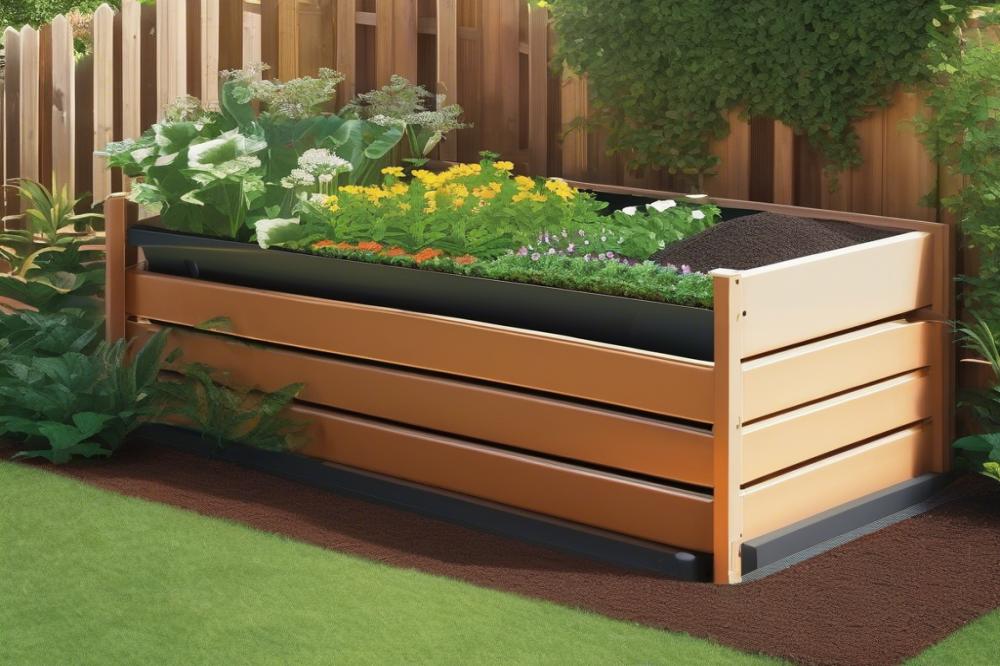

Definition of Composting
Composting is the process of recycling organic waste into a valuable soil amendment. It involves mixing plant materials like leaves, grass clippings, and kitchen scraps. Over time, these materials break down naturally. Microorganisms, worms, and other decomposers play a significant role in this transformation. The end result is nutrient-rich compost that can enhance soil health.
Benefits of Backyard Composting
Backyard composting offers numerous advantages. First, it helps reduce the amount of waste sent to landfills. This practice diverts organic materials, which would otherwise decompose in a waste facility. Composting also lowers greenhouse gas emissions. Your garden can thrive with minimal use of chemical fertilizers when you add compost. This organic matter improves soil structure, promoting better water retention and nutrient availability. Overall, it saves money on gardening supplies while creating a positive impact on the environment.
Role of Compost in Eco-Friendly Gardening
In the realm of eco-friendly gardening, compost serves as a cornerstone. It represents a sustainable practice that benefits both plants and the planet. Using compost in your garden nourishes the soil. Healthy soil leads to robust plants, which are more resistant to pests and diseases. Many gardeners rely on compost to reduce their ecological footprint. Learning various composting methods can empower anyone to adopt greener practices. Engaging with compost bin reviews can help in selecting the best compost bin suited for your needs. By mastering composting tips, you can create your own mini-ecosystem right in your backyard, promoting biodiversity and health.
composting bin Types
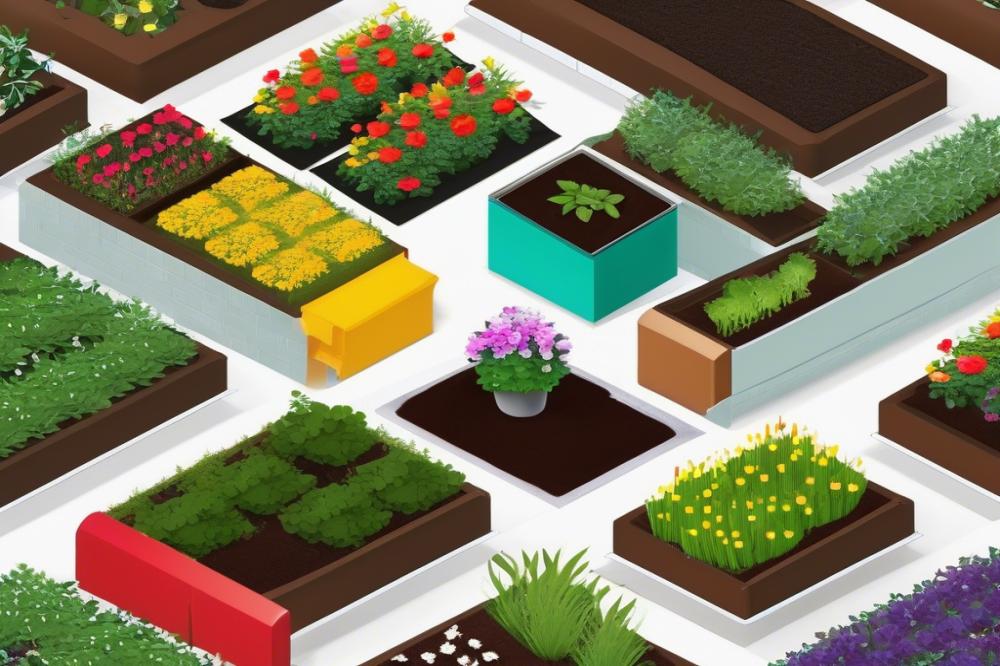

When it comes to composting, choosing the right bin can make a big difference. There are several compost bin types available, each with its own set of features. Understanding these options helps you select the best compost bin for your needs.
Traditional Compost Bins
Traditional compost structures are often simple and effective. They can be made of wood, plastic, or wire mesh. These bins usually sit in one spot and require some manual turning or mixing of the pile. Maintaining air flow is important in these systems, as it speeds up decomposition. Many gardeners appreciate the straightforward nature of backyard composting with these bins.
Compost Tumblers
Compost tumblers offer a more hands-off approach. They come in a barrel shape and rotate easily. Turning the contents is simple and helps mix materials well. This design promotes quicker breakdown of organic waste. Many find that these tumblers are cleaner and more contained than traditional bins. If you prefer convenience, this method might be for you.
Worm Composting Bins
Worm composting bins provide a unique option for eco-friendly gardening. Red wigglers or other composting worms break down food scraps efficiently. This method produces nutrient-rich vermicompost. Worm bins can fit indoors or outdoors, making them versatile. Those who choose this method often appreciate the quick results and minimal odor. It’s a fun way to involve the whole family in composting.
Bokashi Bins
Bokashi bins are another interesting approach to composting methods. This method uses a fermentation process to break down organic matter. With this system, you can compost meat and dairy, which are not suitable for traditional bins. The process requires the use of Bokashi bran, a mix of specific microorganisms. Many find this technique easy to use and a great way to make use of kitchen scraps.
Exploring compost bin reviews can also guide your choice. Take notes on what fits your gardening supplies and style. With the right information and composting tips, your composting journey can thrive and contribute to sustainable practices in your garden.
Factors to Consider When Choosing a Composting Bin
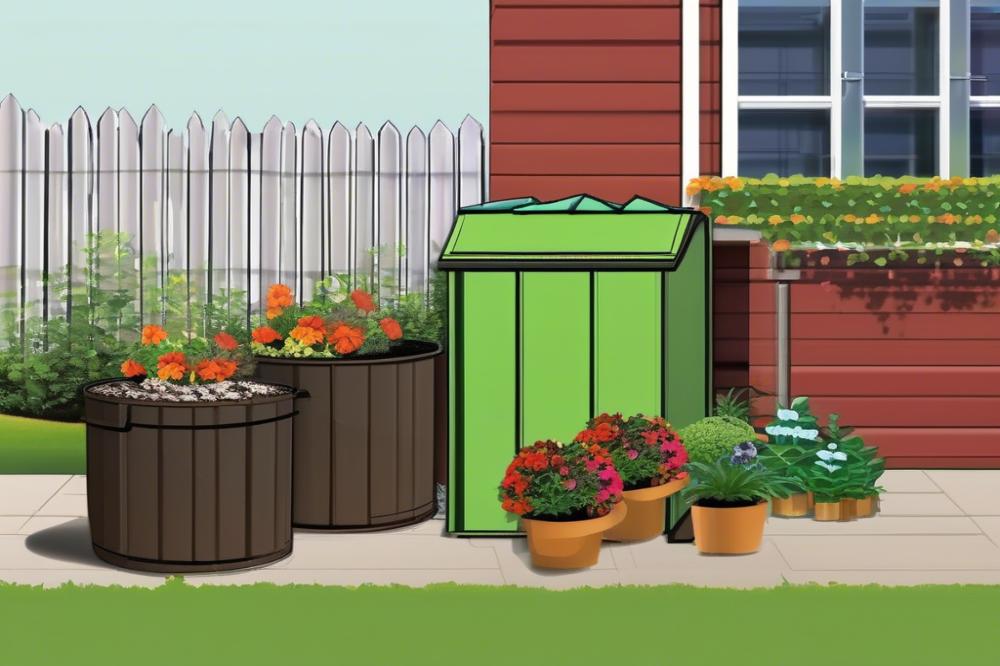

Size and Capacity for Your Garden
Finding the right size is crucial for your composting success. Think about how much organic waste your household creates. If you have a big family or host gatherings, a larger bin may be necessary. On the other hand, if you’re just starting out with backyard composting, a smaller model could work just fine. Also, consider the available space in your garden. Different compost bin types vary in dimensions, so pick one that fits comfortably.
Material
When it comes to materials, options include plastic, wood, and metal. Each has its pros and cons. Plastic bins are often lightweight and easy to handle. Wooden bins can blend well into the garden and provide good insulation for heat retention. Metal composters offer durability, but cost can be high. Think about the aesthetics of your garden as well as the practicality of each option.
Ease of Use and Maintenance
Choose a bin that won’t complicate your composting journey. Some models have features like removable doors or lids for easy access. Look for units with proper aeration. Good airflow is essential for breaking down organic matter efficiently. Maintenance should be simple; you don’t want to spend all your time managing your bin instead of enjoying your garden. Read compost bin reviews to see how other users feel about the upkeep.
Cost and Budget Considerations
Budget plays a vital role in your decision. Prices can range significantly depending on brand and features. A high-quality product may cost more upfront but could save you in the long run with durability and performance. Evaluate your finances carefully before making a purchase, keeping in mind that eco-friendly gardening often pays off in the long term. Look for sales or discounts on gardening supplies, too.
Location and Climate Factors
The location in your garden impacts composting effectiveness. Placing your bin in a sunny spot can help speed up the process. Additionally, consider your climate. In warmer regions, compost breaks down more quickly, while cooler areas may need extra help. Be mindful of local wildlife as well. Some designs deter animals, which is important for successful composting methods.
Best Compost Bin Options
Review of Popular Compost Bins Available
There are many choices when it comes to compost bins. You can find tumblers, stationary bins, and even worm composters. Tumblers are great for those who want to speed up their composting process. They allow for easy mixing and aeration. Stationary bins tend to be more traditional and work well for larger amounts of waste. Worm composters are perfect for smaller spaces, using red wigglers to break down kitchen scraps. Understanding these compost bin types is crucial for effective backyard composting.
Comparison of Features and Benefits
When comparing options, look at size, material, and usability. Some bins are made of plastic, which is lightweight and easy to move. Others are made of wood or metal, offering durability and heat retention. A good bin should allow airflow for proper breakdown of materials. Make sure it has a secure lid to keep pests away. Ease of access is key; you want one that’s user-friendly. Some models feature sliding doors or removable bottom trays for easy access to finished compost.
Recommendations for Different Gardening Needs
If you have a small yard, a compact bin or worm composter is ideal. These are efficient and don’t take up much space. For large gardens, consider a tumbler or a large stationary bin. These can handle more waste and will create compost faster. Those looking for eco-friendly gardening solutions may prefer bins made from recycled materials. Lightweight options are perfect for anyone needing to relocate their setup easily. Explore various composting methods to find what suits your lifestyle and garden best. For beginners, basic setups work wonderfully. More advanced gardeners can look for bins with temperature controls and complex aeration systems.
Composting can be an excellent addition to your gardening supplies. Use these compost bin reviews to guide your selection. Each type comes with unique benefits that serve different needs. With a bit of research, you’ll discover the best compost bin for your garden in no time.
Composting Tips and Techniques
Best Practices for Effective Composting
To make backyard composting work, balance is key. Combine green materials like kitchen scraps with brown materials such as dry leaves and cardboard. This mix allows good air circulation and speeds up decomposition. Use smaller pieces, as they break down faster. Regularly turning the pile introduces oxygen. Consider the location; a sunny spot helps heat up the compost, aiding the breakdown process.
How to Maintain Your Compost Bin
Maintaining a compost system isn’t complicated. Aim for moisture levels similar to a damp sponge. If it’s too dry, add water or green materials. On the flip side, turn the mixture more often if it’s soggy. Keep track of the temperatures; the ideal range is between 130°F to 160°F. This ensures pathogens die and materials decompose efficiently. Monitor the smell. A pleasant earthy aroma tells you it’s working well.
Common Mistakes to Avoid
Many beginners stumble with their composting efforts. Not all food scraps can go into the mix. Avoid adding meat, dairy, and oils as they attract pests. Another frequent error is neglecting to aerate the pile. Without air, it can smell bad and break down slowly. Using too many browns or greens causes imbalance. Strive for variety in compost bin types to find what works best for you.
Troubleshooting Composting Issues
Experiencing problems? Unpleasant odors often indicate too much moisture or green material. If your compost is too dry, gently mix in water. Pests can be a concern, particularly if food scraps are exposed. A good layer of brown materials on top can help. When compost is taking too long to break down, check the balance of materials. Adjusting ratios can quicken decomposition. When in doubt, consult compost bin reviews or gardening supplies resources for alternative solutions.
Sustainable Practices and Eco-Friendly Gardening
Composting is a core element of sustainable gardening. By transforming kitchen scraps and yard waste into nutrient-rich soil, gardeners can reduce landfill waste. This process not only benefits gardens but also the planet. Each time you choose to compost, you are making a positive impact. Many people don’t realize the difference they can make by simply composting.
The benefits of this practice extend far beyond individual gardens. Eco-friendly gardening relies heavily on the use of natural resources. Compost provides essential nutrients to plants, promoting healthier growth. Additionally, it improves soil structure, allowing for better water retention. This means less need for chemical fertilizers, which can harm the environment.
Getting involved in community composting initiatives is another great way to support sustainable practices. Local efforts can unite neighbors in a common goal. Sharing composting tips helps people learn best practices and explore various compost bin types. Organizing workshops can spread knowledge about backyard composting. Such initiatives create a sense of community and encourage eco-conscious choices.
Becoming part of a composting program can enhance local gardens. Crop yields improve when good compost is available. Feedback collected from participants in these programs can guide how to adapt methods to local needs. Not only do these efforts help the environment, but they also strengthen community bonds.
Exploring compost bin reviews before making a purchase will set you up for success. Knowing the best compost bin for your needs makes a big difference. Different composting methods offer diverse ways to recycle waste. Find one that fits your lifestyle and space. Taking these steps lets you actively participate in today’s eco-friendly gardening movement.
Wrapping it Up
Selecting the right composting bin is crucial for maximizing your gardening efforts. A suitable choice can make composting easier and more efficient, helping you to create rich soil for your plants. Remember, different compost bin types exist for various needs. Whether you’re short on space or want a large setup, there’s an option out there just for you.
Improving your garden with compost is not just about reducing waste. It’s also about enriching the earth and supporting plant growth. Healthy soil leads to vigorous plants, which can be truly rewarding. The whole process can feel quite satisfying. Knowing that you’re helping the environment adds even more satisfaction to your gardening journey.
Now is the time to jump into composting. Starting today can have lasting benefits for both your garden and the planet. By thinking about your needs and options, you set yourself up for success. Embrace the chance to recycle organic materials. Together, we can create a more sustainable future, one compost pile at a time.

